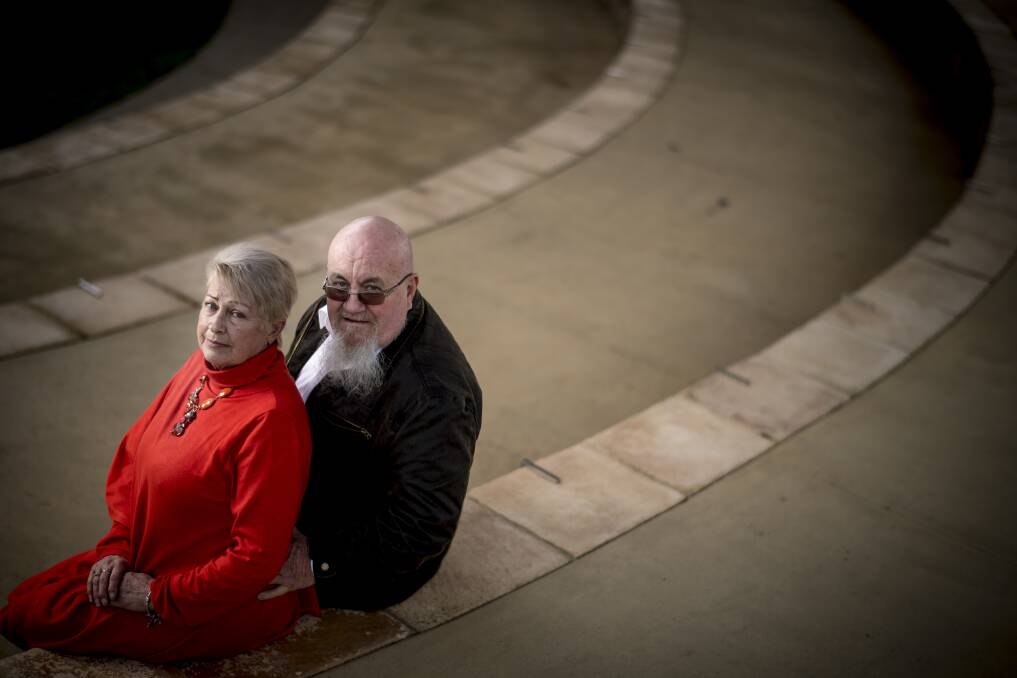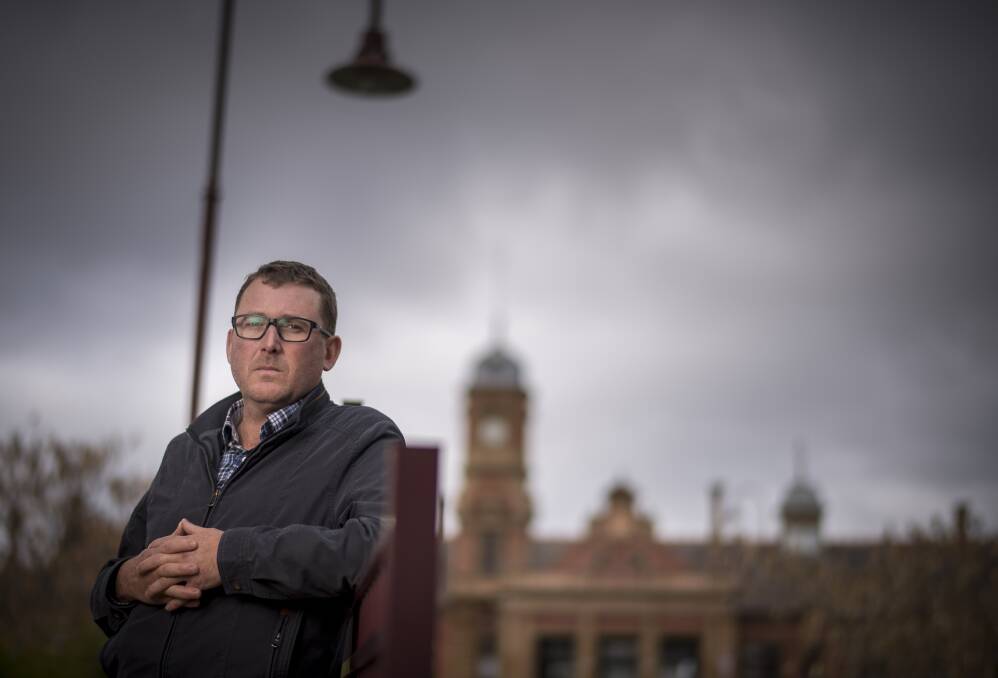
A WOMAN who was forced to tell her husband of more than 20 years he was homeless so he could continue receiving psychiatric care was among the witnesses sharing their experiences with the Royal Commission into Mental Health.
Subscribe now for unlimited access.
$0/
(min cost $0)
or signup to continue reading
Today's session in Maryborough was the sole rural hearing scheduled for the commission, which is seeking to identify and address flaws in a system widely acknowledged to be 'broken'.
Three of today's six witnesses were community members. Two of the witnesses were seeking services for themselves, while one was a carer.
Numurkah resident Chris Thomas said her husband, Trevor Thomas, would not be alive were it not for the advice of a family support worker, who could see where things were headed.
"She said there'll come a day you have to take him down to the hospital and this is probably what is going to happen, and this is what you do," Mrs Thomas said.
"She told me you'll go down there and you'll wait hours, so don't take anyone. Eventually, someone will come from the psychiatric unit and speak to him.
"They'll listen. They'll say yes, he is highly suicidal. Yes, he needs to be admitted. But we don't have a bed.
"She said at that point, they've admitted a duty of care and it's at that point you remind them [they've] admitted a duty of care, get up and walk out.
"And that is exactly what happened."
Mrs Thomas said she was also advised not to go directly home after walking out, 'because the chances are very good they'll put him in a taxi and send him home.'
She was advised to wait in the car park.
True to the family support worker's advice, Mrs Thomas did receive a call shortly after walking out.
But the hospital didn't send Mr Thomas home. They rang to ask if Mrs Thomas could bring her husband some clothes, as they had found a bed.
"I shouldn't have had to, after 20 years of marriage, when he is wanting to die, have to turn my back and walk out and leave him frightened, because prior to that I had his back. No-one should have to do that, " Mrs Thomas said.
Mr Thomas said he had probably had depression-related issues since he was about 18 or 19 years old.
But it wasn't until the early 1980s that he said things started getting on top of him, including relationship breakdown, family members dying by suicide, and difficulties with work.
Mr Thomas said he went and got a diagnosis and had a few counselling sessions, and thought he was "going alright" again.
By the 2000s he was experiencing repeated bouts of depression.
Mrs Thomas said her husband was almost sent home from Prevention and Recovery Care Centre, or PARC, after only one or two visits from a psychiatrist.
"He was no better then than when I'd taken him in three weeks earlier," she said.
"And I was told, once again, they can't send him home if he's homeless.
"You're going to have to tell Trev he can't come home. You've changed the locks.
"So when they told me we're sending him home tomorrow, I said, 'You can't. He's homeless - I've changed the locks. Sorry, Trev. You can't come home'."
Mrs Thomas said the situation made her 'angry as hell'.
"Nobody should have to do that to the person they love," she said.
"He shouldn't have to hear that from me and I shouldn't have to say it. But if I hadn't have, we wouldn't be here today because he would be up in the cemetery
"And he'd be the number 10 from suicide in his family in three generations - they're the confirmed suicides, not the accidents."

Skipton man Al Gabb, a farmer living 45 minutes from Ballarat, told the commission he did not believe the 10 psychologist sessions people were eligible to receive as part of a mental health care plan were insufficient.
"When you're in crisis as a person and your life is in the balance, 10 sessions does not fix everything. It doesn't even start to fix. It gets the ball rolling, yes," Mr Gabb said.
He estimated he and his family had spent a total of about $40,000 on his mental health care, accessing a mix of private and public services.
Costs weren't limited to transportation and services, but also being unable to work on days when Mr Gabb had to travel to Melbourne for appointments with a private psychiatrist.
"It does put the stress on you as a person to go, right, this person is working for me, but the whole day away from the farm, week after week, and the cost of that," Mr Gabb said.
He tried three times to take his own life. The more unwell he grew, the more reclusive he became.
A love of his work at the farm and support from family and friends helped Mr Gabb turn his life around.
Mr Thomas said the mental health system relied to a high degree on the efforts of carers.
"That person becomes your life, basically, holding you up and guiding you," he said.
Mrs Thomas believed the situation for children with acute psychiatric issues was "far, far more scary" than what her husband had endured because of the scarcity of inpatient units.
She said it took 10 months and promises of legal actions and media attention for a child she was aware of to receive the necessary help for a psychiatric issue.
"Do we not have enough psychiatrists? Do we not have enough beds? Or is mental illness not important enough?" she said of the issues plaguing the mental health system.
Mrs Thomas said the mental health system, which she had been fighting with for about 20 years, was so broken, it couldn't be fixed. A new one was needed.
"The only way it is going to happen is people like us standing up and telling our story," she said.
"Thankfully, we've got people who want to listen now," Mr Thomas added.
Patients need more support, health service head says

PEOPLE are becoming lost in the mental health system, the head of the Maryborough District Health Service told the Royal Commission.
Terry Welch provided evidence of the opportunities that existed to improve the way patients with mental health issues received support, with barriers to care within the region ranging from difficulties getting to and affording services to trouble navigating the system.
"We know this community has widespread poverty and disadvantage. That means people have to make choices," Mr Welch said.
"At times, unfortunately, people are making choices that are health-related.
"We see that as a great challenge for us as a health service locally, but also for the system to be able to put in place mechanisms which enable effective care as locally as possible through whatever means we need to use."
More than 1000 of the 12,000 people in the Maryborough area have mental health care plans, according to Mr Welch.
"We know 250 of them are children and adolescents," he said.
He said services provided at the Maryborough Education Centre by both the doctors in school and nurse practitioner programs were well utilised, but "underwhelmingly resourced" for the need that existed in the community.
"We have a one day a week program and it is oversubscribed every week, and something that would easily accommodate more days," Mr Welch said.
He said students at other schools would also benefit from being able to access similar services.
Mr Welch also highlighted differences between the mental health system and the services available for generally medically unwell patients.
The urgent care centre at Maryborough District Health Services gets about 6000 presentations a year from people displaying symptoms of a mental health issue.
Whereas there was a service that coordinated where generally medically unwell patients could be transferred for more intensive care, Mr Welch said the health service had to contact Bendigo Health directly for assistance for a mental health patient.
He said delays for mental health patients could be significantly longer than generally medically unwell patients, as the response was more complex.
"The current mental health model of people sitting in our urgent care centres is just exposing such great risk, and I would hate to be a family member or patient in the scenario we have here," Mr Welch said.
"I think we need to be able to work through a system that reports quicker and accept that some people will be transferred who don't need to be transferred, but it's safer and it's a better outcome.
"We do it with all other elements of health and I think it's time to do it for mental health."
He said patients could also find themselves facing long waits for appropriate care when being referred by a general practitioner, identifying a lack of information about wait times and what was available to be a factor affecting the referral process.
"We need to be able to almost hand-hold patients through this journey," Mr Welch said.
"The stress alone is so difficult for patients and families, yet alone being given a referral to try and navigate to somewhere, and they are definitely getting lost."
Suicide rates in rural areas of Australia are almost double that of metropolitan areas, although the prevalence of mental health conditions in urban and rural settings is comparable.
People came to Maryborough from throughout western Victoria to provide evidence during today's session.
Though some of the issues raised were distinctly rural, such as the tyranny of distance, others included how few sessions with a psychologist were included as part of a mental health care plan.
Several witnesses discussed the place of telehealth in addressing issues associated with distance, the general consensus being that telehealth ought to complement other tools.
If you or someone you know needs support, call Lifeline on 13 11 14 or Beyond Blue on 1300 22 4636.
If life is in danger, call 000.
Have you signed up to the Bendigo Advertiser's daily newsletter and breaking news emails? You can register below and make sure you are up to date with everything that's happening in central Victoria.


